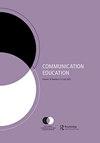在课堂活动中引导流动,促进学生参与
IF 0.9
Q3 COMMUNICATION
引用次数: 0
摘要
摘要基于流理论的原理,该研究提出,在课堂上进行的活动有可能在学生中引发流的体验——一种对手头任务的深度吸收和享受的状态——有可能提高学生的参与度。具体而言,本研究考察了三个课堂活动因素(即最佳挑战、即时反馈、明确目标)对学生流动体验的影响,以及流动体验对三种课堂参与行为(即课堂沉默行为、课堂口头行为和对课程内容的思考)的影响。对从N收集的数据进行路径分析的结果 = 213名学生透露,最佳挑战和即时反馈显著预测了学生的流动体验。此外,学生的流动体验影响了学生的参与行为,并调节了最佳挑战和即时反馈与三种参与行为之间的关系。讨论了主要发现、教学意义以及对未来研究的建议。本文章由计算机程序翻译,如有差异,请以英文原文为准。
Inducing flow in class activities to promote student engagement
ABSTRACT Based on the tenets of Flow Theory, the study proposes that in-class activities that have the potential to induce the experience of flow—a state of deep absorption and enjoyment of tasks at hand—among students are likely to increase students’ engagement. Specifically, the study examined the effects of three in-class activity factors (i.e., optimal challenges, immediate feedback, clear goals) on students’ flow experiences and the impact of flow experiences on three classroom engagement behaviors (i.e., silent in-class behaviors, oral in-class behaviors, and thinking about course content). The results of the path analysis conducted on the data collected from N = 213 students revealed that optimal challenges and immediate feedback significantly predicted students’ flow experiences. Additionally, students’ flow experiences influenced students’ engagement behaviors and mediated the relationship between optimal challenges and immediate feedback and the three engagement behaviors. Key findings, teaching implications, and suggestions for future research are discussed.
求助全文
通过发布文献求助,成功后即可免费获取论文全文。
去求助
来源期刊

COMMUNICATION EDUCATION
EDUCATION & EDUCATIONAL RESEARCH-
CiteScore
3.10
自引率
34.80%
发文量
47
期刊介绍:
Communication Education is a peer-reviewed publication of the National Communication Association. Communication Education publishes original scholarship that advances understanding of the role of communication in the teaching and learning process in diverse spaces, structures, and interactions, within and outside of academia. Communication Education welcomes scholarship from diverse perspectives and methodologies, including quantitative, qualitative, and critical/textual approaches. All submissions must be methodologically rigorous and theoretically grounded and geared toward advancing knowledge production in communication, teaching, and learning. Scholarship in Communication Education addresses the intersections of communication, teaching, and learning related to topics and contexts that include but are not limited to: • student/teacher relationships • student/teacher characteristics • student/teacher identity construction • student learning outcomes • student engagement • diversity, inclusion, and difference • social justice • instructional technology/social media • the basic communication course • service learning • communication across the curriculum • communication instruction in business and the professions • communication instruction in civic arenas In addition to articles, the journal will publish occasional scholarly exchanges on topics related to communication, teaching, and learning, such as: • Analytic review articles: agenda-setting pieces including examinations of key questions about the field • Forum essays: themed pieces for dialogue or debate on current communication, teaching, and learning issues
 求助内容:
求助内容: 应助结果提醒方式:
应助结果提醒方式:


